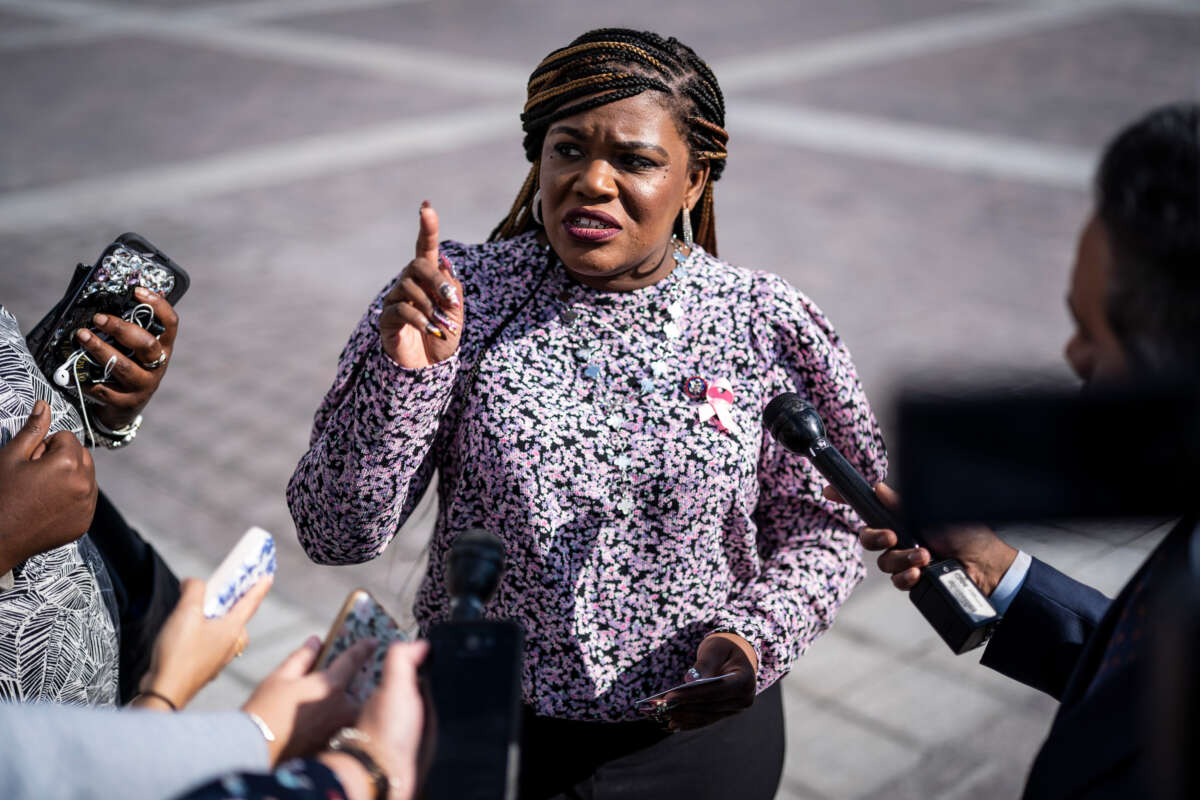Support justice-driven, accurate and transparent news — make a quick donation to Truthout today!
Two Democratic members of Congress are urging Missouri Gov. Mike Parson (R) to stop the execution of Amber McLaughlin, who the state is scheduled to kill next week, citing the “moral depravity” of the death penalty.
In their letter to Parson, Missouri Representatives Cori Bush and Emanuel Cleaver highlighted that McLaughlin was sentenced to death through a unilateral decision by a judge due to a deadlocked jury, and that it appeared her legal counsel did not prepare a proper defense in declining to have an expert testify on her mental health.
The lawmakers also said that the death penalty is an abominable practice that should not be employed by a government that purports to have an interest in justice and rehabilitation.
“Each of us is more than the worst thing we’ve ever done. The same is true for Ms. McLaughlin,” Bush and Cleaver wrote.
“As ordained ministers, we believe in accountability but also the sanctity of life, and do not think these tenets are mutually exclusive. We must therefore make investments in the social and economic well-being of all people,” the lawmakers continued. “In order to do so, we must first acknowledge the moral depravity of executions. They are not about justice; they are about who has institutional power and who doesn’t.”
Barring an intervention by Parson or otherwise, McLaughlin will be the first woman to be executed in Missouri since 1976, when the Supreme Court reinstated the death penalty. She would also be the first openly trans person to be killed via the death penalty. McLaughlin transitioned while on death row.
McLaughlin was convicted of raping and killing her ex-girlfriend in a four-day trial in 2006. Though most states with the death penalty require a unanimous decision by a jury to sentence someone to death, Missouri has an unusual provision that allows a judge to unilaterally decide to implement the death penalty, which is what happened in McLaughlin’s case.
Former judges in Missouri have spoken out against McLaughlin’s sentence, saying that it was only “a flaw in Missouri’s capital sentencing scheme” that allowed her to be sentenced by the judge in her initial trial. “The trial judge made his own findings contrary to the will of the jury, which runs squarely against the fundamental principles of our justice system,” seven former Missouri judges wrote in a letter last week.
Bush and Emanuel urged Parson to consider the “horrific abuse” that McLaughlin experienced as a child at the hands of her adoptive father and her psychological turmoil caused by gender dysphoria — the combination of which resulted in multiple suicide attempts.
McLaughlin’s lawyers have documented this abuse in their petition for clemency filed earlier this month, saying that she was failed by both of her caregivers and the institutions that were supposed to protect her from abuse; McLaughlin was poisoned in the womb as her birth mother ingested alcohol while pregnant, and through various abusive foster care placements, faced horrors like having feces thrust in her face, being beaten, and being tased, her lawyers said.
Bush and Emanuel also pointed out that, as her lawyers have said, McLaughlin has expressed regret for the killing. “McLaughlin consistently and genuinely expressed remorse for the death of Ms. Beverly Guenther,” her lawyers wrote in their petition. “She remains tormented by memories of her death.”
The two Democrats have made similar pleas to Parson before, but he declined to act. In 2021, Bush and Emanuel wrote a letter asking the governor to spare Ernest Johnson from the death penalty, and last month, they asked Parson to stop the execution of Kevin Johnson. Ernest Johnson was executed in October of 2021, and Kevin Johnson was killed in November.
Matching Opportunity Extended: Please support Truthout today!
Our end-of-year fundraiser is over, but our donation matching opportunity has been extended! All donations to Truthout will be matched dollar for dollar for a limited time.
Your one-time gift today will be matched immediately. Your monthly donation will be matched for the whole first year, doubling your impact.
This matching gift comes at a critical time. As Trump attempts to silence dissenting voices and oppositional nonprofits, reader support is our best defense against the right-wing agenda.
Help Truthout confront Trump’s fascism in 2026, and have your donation matched now!
